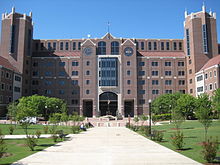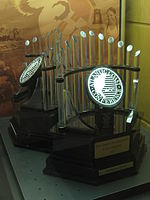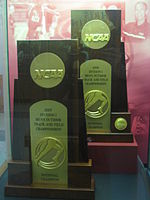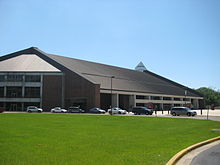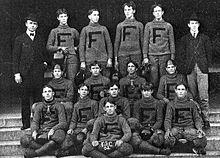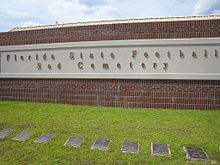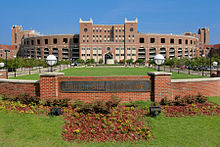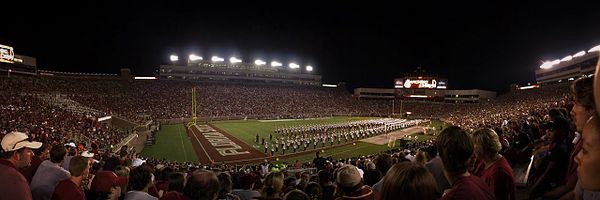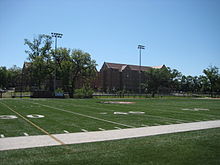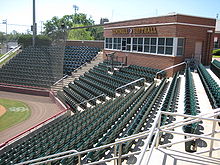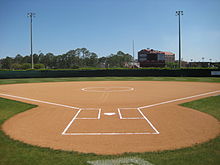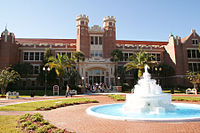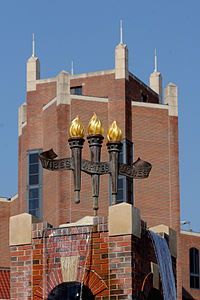- Florida State Seminoles
-
Florida State Seminoles University Florida State University Conference(s) Atlantic Coast Conference NCAA Division I Athletics director Randy Spetman Location Tallahassee, FL Varsity teams 17 Football stadium Bobby Bowden Field at Doak Campbell Stadium Basketball arena Donald L. Tucker Center Baseball stadium Mike Martin Field at Dick Howser Stadium Soccer stadium Seminole Soccer Complex Other arenas Mike Long Track Symbol Seminoles Mascot Chief Osceola Nickname Noles Fight song War Chant & Scalp 'Em Seminoles Colors Garnet and Gold Homepage Seminoles.com The Florida State Seminoles are the men's and women's sports teams of Florida State University in Tallahassee, Florida. Florida State participates in the NCAA's Division I (Division I FBS for football). FSU joined the Atlantic Coast Conference in 1991, and competes in the Atlantic Division in any sports split into a divisional format. The current athletic director is Colonel Randy Spetman, who was introduced on February 4, 2008.
The Seminoles field 17 teams, 8 men and 9 women and have won 12 team National Titles, over 100 team Conference Titles as well as numerous individual national and conference titles. In 1999, the Seminoles football team became the first national champion to begin the season as the top-ranked team without losing that position for the entire season. Recently, the men's outdoor track and field team has won three consecutive NCAA national titles.
The "Seminoles" name is derived from the Seminole people historically of Florida, and was chosen by students in 1947.[1] Since 1978, the teams have been represented by the mascots Chief Osceola and Renegade, the former of whom represents the Seminole chief Osceola. The logo, a profile of a Seminole warrior, was created using the actual profile of Thomas Wright, who wrote the Florida State fight song. The use of the Seminoles and Osceola name and imagery is officially sanctioned by the Seminole Tribe of Florida.
Contents
Overview
Florida State Athletics began in 1902 when the then Florida State College football teams played three seasons.[2] The 1905 Buckman Act reorganized the existing seven Florida colleges into three institutions, segregated by race and gender. As a result of this reorganization, the coeducational Florida State College was renamed the Florida State College for Women.[3] The Florida State University became a co-ed institution in 1947 with most of the newly enrolled male students back from service in World War II. Athletic programs quickly resumed and Florida State fielded its first football team in 43 years with FSU facing Stetson on October 18, 1947.
Florida State was a founding member of the Dixie Conference in 1948 when other southern institutions seeking to create a "purely amateur" athletic conference based on the principle of complete amateurism, with no athletic scholarships. Three years later FSU left the conference to become an independent, having won 3 football, and 2 Men's Track and Field Conference Titles.
In 1976 Florida State joined the Metro Conference in all sports except football, which remained independent. The Metro Conference never sponsored football in the first place. For fifteen years Florida State competed and won 47 conference titles as well as a women's golf National Title, two Softball National Titles and two women's Track and Field National Titles. At the beginning of the 1992 academic fall term Florida State joined the Atlantic Coast Conference.
Since the 1991–1992 academic year, Florida State has been a member of the ACC. In 1993 and 1999 FSU Football won the National Championships. The Men's track and Field team have won three consecutive national titles since 2006. After the 2005 conference expansion was complete FSU was placed in the newly formed Atlantic Division. In the 2005 Inaugural ACC Football Championship game FSU defeated Virginia Tech 27–22. This is their last of their 12 ACC Football titles to date.
Florida State's school colors of garnet and gold are a merging of the University's past. In 1904 and 1905 the Florida State College won football championships wearing purple and gold uniforms. When FSC became Florida State College for Women in 1905, the FSCW student body selected crimson as the official school color. The administration in 1905 took crimson and combined it with the recognizable purple of the championship football teams to achieve the color garnet. The now-famous garnet and gold colors were first used on an FSU uniform in a 14–6 loss to Stetson on October 18, 1947.[4]
There are 8 men's athletic teams and 9 women's teams currently fielded by FSU. They are:
Men's Sports
- Baseball
- Basketball
- Cross Country
- Football
- Golf
- Swimming and Diving
- Tennis
- Track and Field
Women's Sports
- Basketball
- Cross Country
- Golf
- Soccer
- Softball
- Swimming and Diving
- Tennis
- Track and Field
- Volleyball
Facilities
There are two major stadiums and an arena within FSU's main campus. Bobby Bowden Field at Doak Campbell Stadium named after one of the winningest coaches in Division 1 college football history as well as President Campbell which during his administration was instrumental in beginning the Florida-Florida State rivalry. Its capacity is around 83,000. Mike Martin Field at Dick Howser Stadium is the home for Seminole baseball and is named for the long time Seminole skipper, Mike Martin and for former coach Dick Howser, manager for Kansas City, Cleveland, and the New York Yankees as well as returning to coach at Florida State in 1979. The Donald L. Tucker Center is home for men’s and women’s basketball.
Mike Long track is the home of the three time National Champion Men’s Track and Field team. The track has undergone a complete revamp and in 2003 a brand new track, complete with a new surface, wider lanes, faster turns and a larger infield area for hosting field events was unveiled. The new Mcintosh Track and Field Building on the corner of Spirit Way and Chieftan Way in the southern end of the track was completed in 2008 weeks before the Seminoles won their third consecutive National Title.
H. Donald Loucks courts at the Speicher Tennis Center is the home for FSU Tennis. The complex was named in honor of Lieutenant Commander Michael Scott Speicher, a graduate of Florida State University and the first American casualty during Operation Desert Storm. By presidential directive, the facility bears the name the "Scott Speicher Tennis Center."
The Seminole Soccer Complex is home for women’s soccer normally holds a capacity of 1,600 people but has seen crowds in excess of 4,500 for certain games. The home record is 4,582 for a game versus Florida.
The Seminole softball plays at the Seminole Softball Complex and the team takes the field that holds the name of the winningest coach in softball history, Dr. JoAnne Graf.
Rivalries
Florida State's traditional rivals in all sports include the University of Florida Gators and the University of Miami Hurricanes. Florida State University is the only school in the State of Florida to play both the Miami Hurricanes and Florida Gators year in and year out in all sports.
The Bowden Bowl involving Florida State and Clemson University was played from 1999 to 2007. This gridiron rivalry was played between father Bobby Bowden, head coach at FSU, and his son Tommy Bowden, former head coach at Clemson. As of October 13, 2008, Clemson University forced the resignation of Tommy Bowden and thus the Bowden Bowl Era faded into history. FSU & Bobby led the series 5–4.
Florida State University was founded by Francis Eppes VII, a cousin of the third President of the United States (1801–1809) principal author of the Declaration of Independence (1776) and University of Virginia founder Thomas Jefferson. As a result, both teams played for the Jefferson-Eppes trophy in football. With the recent realignment of the divisions in the Atlantic Coast Conference the Florida State Seminoles found themselves in one division and the Virginia Cavaliers in another. The two schools will once again meet in 2010 to renew the rivalry.
FSU enjoys baseball rivalries primarily with the University of Miami and several other ACC teams, including the Georgia Tech Yellow Jackets and Clemson University Tigers.
Championships
Conference championships
Baseball
- 1977, 1980, 1981, 1983–1991 – Metro Conference Champions
- 1995, 1997, 2002, 2004, 2010 – ACC Champions
- 2007, 2008, 2009, 2011 – Atlantic Division Champions
Football
- 1948–1950 – Dixie Conference Champions
- 1992–2000, 2002, 2003, 2005 – ACC Champions
- 2005, 2010 – ACC Atlantic Division Champions
- 2005 – ACC Championship Game Champions
Men's Basketball
- 1954–1955 – Florida Intercollegiate Champions
- 1990–1991 – Metro Conference Champions
Men's Golf
- 1977–1987, 1989, 1990 – Metro Conference Champions
- 2008 – ACC Champions
Softball
- 1992, 1993, 1995–2000, 2003, 2004, 2011 – ACC Champions
Men's Swimming
- 2007 – ACC Champions
Women's Swimming
- 2006 – ACC Champions
Women's Soccer
- 2011 - ACC Champions
Track
- Men's Indoor Track and Field
- 1994, 2003–2010 – ACC Champions
- Women's Indoor Track and Field
- 2009 – ACC Champions
- Men's Outdoor Track and Field
- 1950, 1951 – Dixie Conference Champions
- 1972–1974 – Southeastern Champions
- 1977–1991 – Metro Conference Champions
- 2002–2011 – ACC Champions
- Women's Outdoor Track and Field
- 1989–1991 – Metro Conference Champions
- 2000, 2009 – ACC Champions
- Men's Cross Country
- 2010 – ACC Champions
- Women's Cross Country
- 2007–2011 – ACC Champions
Volleyball
- 1983, 1985–1989 – Metro Conference Champions
- 1998, 2009, 2011 – ACC Champions
National championships
- 1951 – Men's Gymnastics (NCAA National Champion)
- 1952 – Men's Gymnastics (NCAA National Champion)
- 1981 – Women's Golf (AIAW National Champion)
- 1981 – Women's Softball (AIAW National Champion)
- 1982 – Women's Softball (AIAW National Champion)
- 1984 – Women's Indoor Track and Field (NCAA National Champion)
- 1985 – Women's Outdoor Track and Field (NCAA National Champion)
- 1993 – Football (as awarded by the AP and the ESPN-USA Today Coaches Polls)
- 1999 – Football (as awarded by the AP and the BCS)
- 2006 – Men's Outdoor Track and Field (NCAA National Champion)
- 2007 – Men's Outdoor Track and Field (NCAA National Champion)
- 2008 – Men's Outdoor Track and Field (NCAA National Champion)
Baseball
Dick Howser Trophy winners J. D. Drew 1997 Buster Posey 2008 Head Coach Mike Martin (31st Season) Seminole baseball is one of the most successful collegiate baseball programs in the United States having been to 20 College World Series in 49 Tournament appearances, and having appeared in the national championship final on three occasions (falling to the University of Southern California Trojans in 1970, the University of Arizona Wildcats in 1986, and the University of Miami Hurricanes in 1999).
Under the command of Head Coach No. 11 Mike Martin (FSU 1966), Florida State is the second-winningest program in the history of college baseball. Since 1990, FSU has had more 50 win seasons, headed to more NCAA Tournaments (19 Regional Tournaments in 20 years), and finished in the top 10 more than any team in the United States. Since 2000, FSU is the winningest program in college baseball with more victories and a higher winning percentage in the regular season than any other school. Despite their regular-season success and winning sixteen conference championships, Florida State is still chasing their first College World Series Championship.
Mike Martin Field at Dick Howser Stadium
- Field dimensions:
- 340’ – left field
- 400’ – center field
- 320’ – right field
- Stadium capacity: 6,700
Mike Martin Field at Dick Howser Stadium is located on the FSU campus. When it opened in 1983, it held approximately 6,000 seats. A two-year, $12 million project that was completed in 2004 upgraded the stadium capacity to 6,700 and installed a new video board, a new public address system, the Griffin Family Clubhouse and the Mike Loynd Tradition Room.[5]
Mike Martin Field is also home to the so-called Animals of Section B, a boisterous group of baseball fans whose name dates to 1978.
Basketball
Donald L. Tucker Center
Donald L. Tucker Center is a 12,100-seat multi-purpose arena in Tallahassee, Florida, located just a block southeast of the FSU main campus. The arena opened in 1981 was built at a cost of $33.8 million. It is home to the Florida State University Seminoles men's and women's basketball teams. Formerly known as the Tallahassee-Leon County Civic Center, it was renamed, in accordance with a 2004 act of state legislation, in honor of Donald L. Tucker, a former Speaker of the Florida House of Representatives and Special Ambassador for the United States to the Dominican Republic. Prior to the opening of the Tucker Center, Florida State's basketball teams played on-campus at Tully Gymnasium.
The Tucker Center has 34 luxury suites, 468 club seats as well as a 450-seat arena-view restaurant. A four-sided Megavision video display is located in the center of the arena
Men's Basketball
Retired Jerseys Bob Sura #3 Sam Cassell #10 Dave Cowens #13 Ron King #33 Coach Hugh Durham #25 Head Coach Leonard Hamilton (7th Season) Florida State's baketball programs, after not starting until the mid-part of the twentieth century, have built success in terms of victories, 20-win seasons, NCAA Tournament participation, and in the individual honors picked up by Florida State players. The men's basketball team has enjoyed modest NCAA Tournament success since their first appearance in the NCAA tournament in 1968. Over the last forty years, the Seminoles have played for the national title in the NCAA championship game in 1972, advanced to the Sweet 16 round in 1992 and 2011, and made the Elite Eight round in 1993.
Florida State is one of only two ACC schools that have had at least one player selected in each of the last five NBA Drafts. Hearing their names called on recent draft days were Tim Pickett by the New Orleans Hornets in 2004, Von Wafer by the Los Angeles Lakers in 2005, Alexander Johnson by the Indiana Pacers in 2006, Al Thornton by the Los Angeles Clippers in 2007, Toney Douglas by the Los Angeles Lakers (then traded to the New York Knicks) in 2009, Solomon Alabi by the Dallas Mavericks (then traded to the Toronto Raptors) in 2010 and Ryan Reid by the Indiana Pacers (then traded to the Oklahoma City Thunder) in 2010. A total of 37 Seminoles have been selected in the NBA Draft including seven first round picks. Among those first round selections are Dave Cowens, one of the greatest centers in NBA history, and George McCloud, the first lottery selection in school history. Today, five Seminoles are on NBA rosters and 16 have played in the league in the last 17 years.[6]
Women's Basketball
Retired Jerseys Brooke Wyckoff #21 Wanda Burns #22 Tia Paschal #30 Sue Galkantas #43 Head Coach Sue Semrau (11th Season) Like the Florida State men's team, the Seminole women's team plays its basketball in the Donald L. Tucker Center. FSU has seen recent success under head coach Sue Semrau. In the 2004–05, 2005–06, and 2006–07 seasons, FSU recorded 20 or more wins, finished 4th in the ACC regular season standings, and advanced to the NCAA Women's Tournament each year. In the 2005–06 season, FSU entered the USA Today/ESPN Coaches Poll for the first time at No. 19. The Seminoles earned a No. 6 seed in the 2005–06 NCAA Women's Tournament. In the 2006–07 season, Florida State advanced to its first NCAA Tournament Sweet 16 in school history with a 68–61 victory at Stanford. The FSU women ended the 2007–08 season with 19 wins, following a 2nd round NCAA loss to Oklahoma State in overtime by just one point. In the last three years, Florida State's women's team has continued its success, making the NCAA Tournament each year, including reaching the Elite Eight round, the deepest advance in the tournament in program history, in 2010. In that year, Coach Semrau's women fell to eventual national champion and perennial women's basketball power, Connecticut.
Football
See also: List of Florida State University football players and Miami–Florida State football rivalryHeisman Trophy winners Charlie Ward 1993 Chris Weinke 2000 Head Coach Jimbo Fisher (1st Season) In 1902, the Florida State College in Tallahassee fielded its first football team. The program posted a record of 7–6–1 over the next three seasons, including a record of 3–1 against their rivals from the University of Florida (formerly Florida Agricultural College) in Lake City. In 1904, the Florida State football team became the first ever state champions of Florida after beating both the University of Florida and Stetson University. In 1905, however, the Florida higher education system was reorganized, creating the new University of Florida, in Gainesville, and the Florida State College for Women, in Tallahassee. All male students, including the football team, were moved to the Gainesville campus.
With the formation of Florida State University in 1947, the school once again started a football team. After its first year, FSU joined the Dixie Conference, which it won in each of the three years it was a member. It left the conference in 1951 and competed as an independent team for the next forty years.[7]
Under head coach Bobby Bowden, retired after his 34th year, the Seminole football team became one of the nation's most competitive football teams, greatly expanding the tradition of football at Florida State.[8] The Seminoles played in five national championship games between 1993 and 2001, and have claimed the championship twice, in 1993 and 1999. The FSU football team was the most successful team in college football during the 1990s, boasting an 89% winning percentage.[9] FSU also set an NCAA record for most consecutive Top 5 finishes in the AP football poll – receiving placement 14 years in a row, from 1987 to 2000. The Seminoles were the first college football team in history to go wire-to-wire (ranked first place from preseason to postseason) since the AP began releasing preseason rankings in 1936. FSU also owns the record for most consecutive Bowl game victories with 11 between 1985 and 1996.[8] The Seminole Football team has also won 15 Conference championships in the Dixie and Atlantic Coast. The Seminoles are the second winningest team in college football since 1990 behind the first ranked University of Florida Gators. The Seminoles are currently coached by Jimbo Fisher.
Before former FSU Football head coach Bobby Bowden retired, he was five victories behind Penn State's Joe Paterno as the NCAA Division I (BCS). FSU football is well-known for introducing talented players into the NFL, including Fred Biletnikoff, Deion Sanders, Terrell Buckley, Derrick Brooks, Sebastian Janikowski, Walter Jones, Corey Simon, Anquan Boldin, Javon Walker, Warrick Dunn, Peter Boulware, Laveranues Coles, Brad Johnson, Samari Rolle, and many other players in recent history.
The Sod Cemetery
In 1962, the FSU football team captains returned to Tallahassee with a piece of the turf from Sanford Stadium after defeating Georgia 18–0 in Athens. The turf was presented to Dean Coyle E. Moore who founded the tradition of the sod game.
The sod cemetery began when the first piece of sod was buried in the corner of the Florida State practice field and a monument was placed to commemorate the road victory. In the early years, FSU only snipped grass when it won by upset on the road. But as the Seminoles became more successful, the criteria changed. Sod games still represent road games won when FSU is a significant underdog, however, all bowl games are now considered sod games as well as landmark road wins no matter who was favored. Each piece of sod is buried in the cemetery next to the practice field and a tombstone is placed above it with the score and date of the game.[10]
Bobby Bowden Field at Doak Campbell Stadium
The stadium, named after former Florida State President Doak S. Campbell, hosted its first game against the Randolph-Macon College Yellowjackets on October 7, 1950 with the Seminoles winning the game 40–7. At that time the facility had a seating capacity of 15,000. Florida State began to play at Centennial Field during the team's inaugural 1947 season and would continue to play there for the following two years (1948 and 1949). The stadium has expanded numerous times; from 15,000 seats to 19,000 in 1954, to 25,000 in 1961 and to 40,500 between the years 1960 and 1970. Since that time, the stadium has expanded to almost 83,000, largely in part to the success of the football team under head coach Bobby Bowden coupled with the ever growing student body. It now is the largest football stadium in the Atlantic Coast Conference (ACC) and the fourteenth largest stadium in the NCAA.
- Prior to the start of the 2007 Season a new state-of-the-art sound and public address system was installed.
- At the end of the 2007 Seminole Football Home Season work began on installing two new LED Scoreboards as well as four new LED ribbon boards.
The University Center Doak Campbell Stadium is a unique venue in collegiate football. It is contained within the brick facade walls of University Center, a vast complex that houses the offices of the University, the Registrar, School of Hospitality as well as numerous other offices and classrooms.
- The University Center A (East wing)
Building A houses the offices of the Registrar, Financial Aid, Admissions and Dean of Students. The Career Center is also located here until it is moved to the new Student Success Center. The Award Winning Film School is Located in the 2nd wing of Building A. The top two floors are home to Skyboxes
- The University Center B (South Wing)
Building B holds the Seminole Sportshop as well as Visitor Services. UCB is also home to the University Center Club and to the Osceola Sports Grill, the ultimate way to watch a Seminole Football game. The highly ranked Dedman School of Hospitality is located on the second floor of Building B.
- The University Center C (West Wing)
Building C is home to the College of Communication, Florida State Testing Center as well as the College of Social Work. The Athletics Ticket office is also located here as are many of the offices of Seminole Boosters. Floor nine is home to the Press Boxes with two floors of Skyboxes below.
- Moore Athletic Center (University Center D)
Located on the North Side of Doak Campbell, the athletic center houses nearly all of the athletic offices as well as some classrooms and lecture halls. Visitors are welcomed into the Great Hall showcasing the best of Seminole Athletics. The two National Championship Football trophies are on display for all to see.
Harkins Field
Harkins Field is an artificial turf with rubber fill field built near the Flying High Circus. Bill Harkins, head coach of the men's lacrosse team, was instrumental in the field's design and construction. Previously the space was a muddy space of land what would frequently flood. The Florida State University Marching Chiefs have the Manley R. Whitcomb Band Complex situated near the field and use it for their practices. Florida State Football uses the field primarily to prepare when they travel to face an opponent with an artificial turf field. The lacrosse team practices and plays all of its home games at the facility.
Track & Field
The FSU men's Track & Field team has won back-to-back-to-back NCAA national championships and Atlantic Coast Conference championships (2006–2008). In 2006, Head Coach Bob Braman and Associate Head Coach Harlis Meaders helped lead individual champions in the 200 m (Walter Dix), the triple jump (Raqeef Curry), and the shot put (Garrett Johnson). Individual runners-up were Walter Dix in the 100 m, Ricardo Chambers in the 400 m, and Tom Lancashire in the 1500 m. Others scoring points in the National Championship were Michael Ray Garvin in the 200 m (8th), Andrew Lemoncello in the 3000 m steeplechase (4th), Raqeef Curry in the long jump (6th), and Garrett Johnson in the discus (5th).[11] In 2007, FSU won its second straight men's Track & Field NCAA National Championship when Dix became the first person to hold the individual title in the 100 m, 200 m, and 4*100 m Relay at the same time.[12]
Women's Softball
- Head Coach: Lonni Alameda
The Seminole softball team plays at the Seminole Softball Complex; the field is named for JoAnne Graf, the winningest coach in softball history.[13] The winningest coach in softball history keeps pushing her record farther and farther up the charts. Following the program's 25th 40-win season in 2006, Graf's 1,355 total wins are 149 ahead of the next closest coach. An 8–1 victory over Jacksonville on February 22, 2006, made her only the second coach in NCAA history to record 1,100 NCAA fast-pitch wins. In 1999, Florida State received a state-of-the-art softball complex, which also houses the Seminole soccer stadium. The result was the creation of one of the nation's premier collegiate joint softball and soccer facilities.
Seven trips to the Women’s College World Series, 19 NCAA Tournaments, 24 All-Americans, 10 conference titles in 15 years and one of the nations’ premiere softball facilities and that’s just scratching the surface of what it means to play softball at Florida State. From the time FSU won its first national championship in 1981, the nation’s best players have come to play for legendary head coach Dr. JoAnne Graf and wear Garnet and Gold.
For over two decades those players have made FSU one of the most dominant softball programs in the history of collegiate softball. Only five teams in the history of the NCAA have been to more WCWS than Florida State and no school east of Arizona has been to more NCAA Tournaments than the Seminoles. Florida State’s success on the field is remarkable. The Tribe has never endured a losing season in coach Dr. Graf ’s 28 years as they have won 76% of the 1786 games they have played. Only UCLA has amassed more program wins than Florida State’s 1136 since 1984 and the Seminoles have a winning record against over 80% of the 165 opponents they have faced in the program’s illustrious 28-year history. Nothing has changed recently either as over the last 15 seasons, FSU has amassed 761 wins or an average of more than 50 victories a season.
JoAnne Graf Field at the Seminole Softball Complex
- Field Dimensions:
- 200’ – right and left field
- 220’ – center field
- Stadium Capacity: 1,000
JoAnne Graf Field at the Seminole Softball Complex is state of the art in every facet and provides Florida State softball players with an all-inclusive complex that includes locker rooms, meeting rooms and one of the best playing surfaces anywhere in the country.
Florida State has posted 217 wins in its eight years at the complex. Even more impressive, FSU has gone 164–36 at the complex the last six years for an amazing .820 winning percentage. The complex was also featured in Athletic Business Magazine’s 2002 Architectural Showcase.
Florida State’s dream of a new, state-of-the-art softball complex became reality when ground was broken in a ceremony in the spring of 1998. Construction workers worked continuously to complete the facility, which also houses the Seminole soccer stadium. The result was the creation of one of the nation’s premier collegiate softball and soccer facilities. The complex, which was completed in the spring of 1999, includes ticket and concessions buildings and spacious press boxes with radio/television booths. The two-level Mary Ann Stiles & Barry Smith Team Building features a reception area, softball and soccer coaches offices, which overlook their respective stadiums, a combined workroom, large team and coaches locker rooms and training and equipment rooms.
On April 2, 2005, university president Dr. T.K. Wetherell and Dave Hart officially renamed the softball stadium “JoAnne Graf Field at the Seminole Softball Complex.” She joins Bob Heck of Georgia State as the only two active softball coaches with fields named after them. The stadium got a facelift as a Florida State will unveil a brand new video scoreboard for the 2007 season. The board uses the same technology that is used at most outdoor professional stadiums. The ProStar is capable of displaying video clips, live video, animation, player head shots, graphics and statistics in 4.3 trillion colors.
The Seminole Softball/Soccer Complex is located in between the Dick Howser Baseball Stadium and the Mike Long Track on Chieftan Way. The facility can be accessed from both Chieftan Way and Stadium Drive.
Women's Soccer
Hermann Trophy winners Mami Yamaguchi 2008 Head Coach Mark Krikorian (4th Season) Florida State University has built one of the top women's soccer programs in the nation. The University added women's soccer as its 17th varsity sport in 1998. The Seminoles have appeared in the NCAA tournament every year since 2000 and have appeared in the ACC tournament final in 2001 and 2004. FSU is one of only a few schools to have played in the NCAA Women's College Cup four times in the last five years, appearing in 2003, 2005–2007. In 2007, the Seminoles were national runner-up, losing 2–0 to USC in the national championship match.
- All-Americans
- 2 India Trotter (2002–2006) – First Team All-American
- 8 Selin Kuralay (2003–present) – Second Team All-American
- 10 Kelly Rowland (2002–2006) – First Team All-American
- 13 Leah Gallegos (2002–2004) – Third Team All-American
Seminole Soccer Complex
In 1998, FSU built a state-of-the-art soccer and softball complex. The 1,600-seat stadium is only for the women's soccer team since FSU doesn't have a varsity soccer or lacrosse team. Florida State's women's soccer team is 91–32–7 (74%) at home.
Academic cheating scandal
In Spring 2007, several FSU athletes, including football players, were accused of cheating in an online music history class. The NCAA ruled that Florida State was guilty of major violations, announced that it would reduce scholarship limits in 10 sports and force Florida State to vacate all of the victories in 2006 and 2007 in which the implicated athletes participated and placed the university on probation for four years.[14] Florida State appealed parts of the decision.[15]
On January 5, 2010 the NCAA Infractions Appeals Committee denied FSU's appeal and ruled that all penalties, including vacating up to fourteen football wins during the 2006–2007 seasons. FSU officials responded that they were surprised and disappointed by the NCAA decision and felt that their own investigation and self-imposed penalties were sufficient. The NCAA Infractions Appeals Committee responded that "the cooperative efforts of the university in the academic cheating scandal involving 61 Florida State athletes failed to outweigh the aggravating factors in the case."[16] The games to be vacated will be determined by certifying which of the 14 games any of the 25 ineligible players competed.[17]
Notable alumni
As a major competitor in college athletics, Florida State University has many notable student athletes, coaches and staff members. Many of the most notable members are listed in FSU's Hall of Fame and represent all major collegiate sports.[18] Currently, 75 FSU alumni compete in professional basketball, American football, baseball and golf.[19]
References
- ^ http://unirel.fsu.edu/seminoles/pages/timeline.html
- ^ FSU 150th Anniversary – History || Coming of Age || Athletics
- ^ [1] State Library and Archives of Florida – Florida Photographic Collection, Westcott Building at the Florida State College for Women, published 193-. Archives metadata: Fountain and Westcott Building at Florida State College for Women. Retrieved on 4–29–2007.
- ^ Florida State University Official Athletic Site
- ^ "Dick Howser Stadium". http://seminoles.cstv.com/trads/fsu-trads-fac-howser.html. Retrieved 2007-09-24.
- ^ "Profile: Men's Basketball" (PDF). Seminoles.com. http://graphics.fansonly.com/schools/fsu/graphics/mediaguides/06-mbb/2006-07universitysection.pdf. Retrieved 2007-09-24.
- ^ "Florida State Historical Data". College Football Data Warehouse. http://cfbdatawarehouse.com/data/div_ia/acc/florida_state/championships.php. Retrieved 2007-12-15.
- ^ a b "Profile: Bobby Bowden". Seminoles.com. http://seminoles.cstv.com/sports/m-footbl/mtt/bowden_bobby01.html. Retrieved 2007-06-30.
- ^ "3peatTrojans's SportingBlog: The Great College Football Debates: Coaches pt.3". SportingNews.com. http://www.sportingnews.com/blog/3peatTrojans/23667/. Retrieved 2007-07-06.
- ^ "Sod Cemetery". http://seminoles.cstv.com/trads/fsu-trads-cemetery.html. Retrieved 2007-09-24.
- ^ "Florida State University, Student Profiles – Garrett Johnson". http://fsu.edu/profiles/johnson/. Retrieved 2007-05-08.
- ^ "Track & Field: FSU Wins Back-to-Back National Titles". Seminoles.com. http://seminoles.cstv.com/sports/c-track/spec-rel/060907aae.html. Retrieved 2007-06-09.
- ^ "JoAnne Graff". http://seminoles.cstv.com/sports/w-softbl/mtt/graf_joanne00.html. Retrieved 2007-09-24.
- ^ Zinser, Lynn (2009-03-07). "N.C.A.A. Penalizes Florida State for Academic Fraud". The New York Times. http://www.nytimes.com/2009/03/07/sports/ncaafootball/07ncaa.html. Retrieved 2010-05-02.
- ^ "Florida State formally appeals part of NCAA sanctions". USA Today. 2009-04-23. http://www.usatoday.com/sports/college/2009-04-23-fsu-appeal_N.htm. Retrieved 2010-05-02.
- ^ Florida State loses NCAA appeal; Bowden to lose victories
- ^ FSU loses NCAA appeal, must vacate wins
- ^ "Florida State University, Seminoles.Com website for FSU Athletics – FSU Hall of Fame". http://seminoles.cstv.com/trads/fsu-trads-hall-new.html. Retrieved 2007-07-01.
- ^ "Noles in the Pros". Seminoles.Com. http://seminoles.cstv.com/ot/nolesinthepros.html. Retrieved 2007-07-01.
External links
Atlantic Coast Conference Atlantic Division Boston College Eagles • Clemson Tigers • Florida State Seminoles • Maryland Terrapins • North Carolina State Wolfpack • Wake Forest Demon Deacons
Coastal Division Future members Pittsburgh Panthers (TBA) • Syracuse Orange (TBA)
Championships & awards Conference champions • National championships • Athlete of the Year
Division I college sports teams of Florida Bethune-Cookman Wildcats • Florida International Golden Panthers • Florida Gators • Florida A&M Rattlers • Florida Atlantic Owls • Florida Gulf Coast Eagles • Florida State Seminoles • Jacksonville Dolphins • Miami Hurricanes • North Florida Ospreys • South Florida Bulls • Stetson Hatters • UCF Knights
Sports teams in Florida Baseball MLB: Miami Marlins • Tampa Bay Rays - SL: Jacksonville Suns • Pensacola Blue Wahoos - FSL: Bradenton Marauders • Brevard County Manatees • Charlotte Stone Crabs • Clearwater Threshers • Daytona Cubs • Dunedin Blue Jays • Fort Myers Miracle • Jupiter Hammerheads • Lakeland Flying Tigers • Palm Beach Cardinals • St. Lucie Mets • Tampa Yankees - GCL: Blue Jays • Braves • Cardinals • Indians • Marlins • Mets • Nationals • Orioles • Phillies • Pirates • Rays • Red Sox • Tigers • Twins • Yankees
Basketball NBA: Miami Heat • Orlando Magic - CBL: Florida Flight • Gainesville Galaxy • Heartland Prowl • Miami Stars • Palm Beach Titans - ABA: Eatonville • Heartland Heat • Jacksonville Giants • Orlando Kings • Panama City DreamFootball NFL: Jacksonville Jaguars • Miami Dolphins • Tampa Bay Buccaneers
AFL: Jacksonville Sharks • Orlando Predators • Tampa Bay Storm - UIFL: Florida Tarpons • Lakeland Raiders
WFA: Gulf Coast Riptide • Jacksonville Dixie Blues • Miami Fury • Orlando Anarchy • Palm Beach Punishers • Tallahassee Jewels • Tampa Bay Pirates - LFL: Orlando Fantasy • Tampa BreezeHockey NHL: Florida Panthers • Tampa Bay Lightning - ECHL: Florida Everblades • Orlando Solar Bears - SPHL: Pensacola Ice FlyersLacrosse Soccer NASL: Fort Lauderdale Strikers • FC Tampa Bay - USL Pro: Orlando City S.C. - USL PDL: Bradenton Academics • Central Florida Kraze • FC Jax Destroyers • Fort Lauderdale Schulz Academy - WPS: magicJack - WPSL: Brandon FC • Florida Sol FC • FSA Freedom • Gulf Coast Texans • Palm Beach United • South Florida Strikers • Tampa Bay Hellenic - NPSL • Jacksonville United FCRoller derby WFTDA: Gold Coast Derby Grrls • Jacksonville RollerGirls • Tallahassee RollerGirls • Tampa Bay Derby Darlins - MRDA: Magic City MisfitsRugby league Rugby union College athletics
(NCAA Division I)Bethune-Cookman Wildcats (MEAC) • Florida Gators (SEC) • Florida A&M Rattlers (MEAC) • Florida Atlantic Owls (Sun Belt) • Florida Gulf Coast Eagles (A-Sun) • Florida International Golden Panthers (Sun Belt) • Florida State Seminoles (ACC) • Jacksonville Dolphins (A-Sun/Pioneer) • Miami Hurricanes (ACC) • North Florida Ospreys (A-Sun) • South Florida Bulls (Big East) • Stetson Hatters (A-Sun) • UCF Knights (C-USA)Categories:- College sports teams in the United States by team
- Florida State University
- Sports in Tallahassee, Florida
- College sports teams in Florida
Wikimedia Foundation. 2010.


